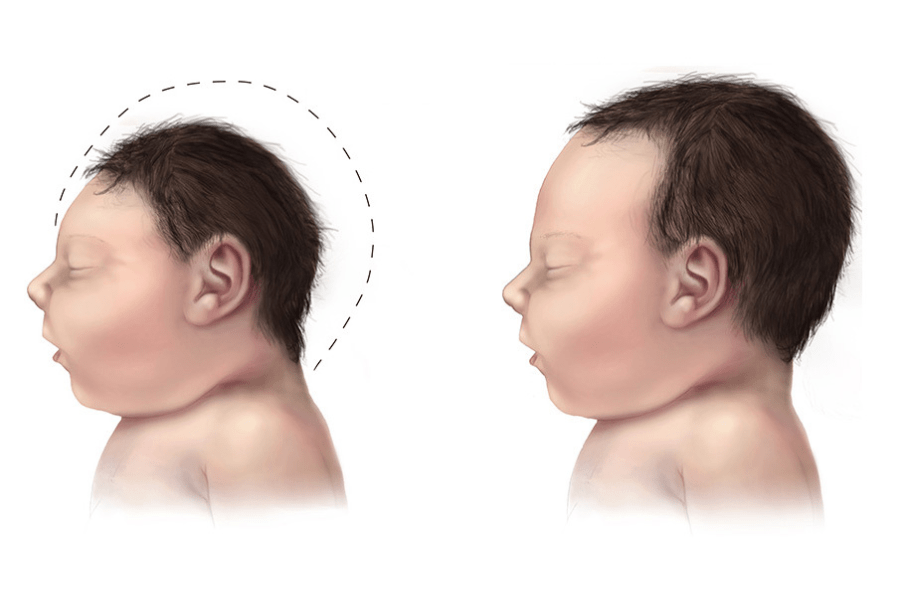Cephalic Disorders
Overview

Did you know that cephalic disorders can have a significant impact on the development of a fetus' central nervous system?
The brain and spinal cord are crucial parts of how our bodies work, and any disruption during development can lead to a range of conditions that can vary in severity.
Some of these disorders can be fatal, while others can cause lifelong disabilities. However, with timely diagnosis and treatment, some of these disorders can be managed effectively.
It is important to seek medical attention if you suspect that your child may be experiencing symptoms of a cephalic disorder.
Symptoms
• Intellectual disabilities may manifest as one of the prevalent symptoms.
• Seizures or epilepsy episodes can occur in affected individuals.
• Movement disorders and challenges with muscle control are common symptoms.
• Sensory deficits may include partial or complete loss of vision, hearing, smell, taste, and touch.
• Weakness or paralysis may result from issues affecting the spinal cord or nerves.
• Individuals may experience difficulties with automatic bodily functions such as digestion and breathing, along with varying degrees of pain.
Causes & Risks
• Genetics play a significant role, with DNA mutations—either inherited or spontaneous—being a key factor in cephalic disorders.
• Medical conditions during pregnancy, such as metabolic diseases or infections like toxoplasmosis, cytomegalovirus, or rubella, can adversely affect fetal development.
• Exposure to substances like toxic metals (e.g., lead, mercury) or certain medications during pregnancy can also contribute to cephalic disorders.
• Environmental conditions, including radiation exposure, may pose risks to fetal development and increase the likelihood of cephalic disorders.
• Physical injuries sustained during pregnancy can elevate the risk of fetal injury, potentially impacting nervous system development.
• Cephalic disorders can stem from a combination of genetic predisposition, prenatal medical conditions, environmental exposures, and physical trauma during pregnancy.
Test & Diagnosis
• Cephalic disorders encompass various medical conditions impacting the head and brain, detectable before or after birth.
• Sonography aids pre-birth diagnosis for some disorders, while others require post-birth visual examination.
• Additional diagnostic methods include imaging tests like X-rays, CT scans, and MRI scans.
• Laboratory blood or other fluid tests may also be necessary for accurate diagnosis.
• Genetic testing is another valuable tool in identifying underlying conditions contributing to cephalic disorders.
• Accurate diagnosis and effective management of cephalic disorders require a comprehensive evaluation using various diagnostic approaches.
Treatment
• Treatment approaches for cephalic disorders range from untreatable conditions with severe impacts to those manageable through surgery or other interventions.
• Some disorders may require symptom management with medications, assistive devices, corrective braces, or other supportive measures.
• Healthcare providers offer guidance tailored to individual cases, explaining available procedures and recommended treatment options.
• Recommendations may include strategies to optimize treatment effectiveness and improve outcomes.
• Collaborating with healthcare providers ensures informed decision-making and personalized care plans.
• Patients and caregivers benefit from understanding available treatment options and how to maximize their effectiveness through professional guidance.
Living With
• Typically, parents, guardians, or caregivers are the first to learn about cephalic disorders, often diagnosed soon after birth or within the first few years of life.
• Healthcare providers offer the most reliable information regarding the prognosis and management of cephalic disorders.
• The impact of cephalic disorders varies widely, with some causing minimal effects and manageable with minor adjustments.
• Early intervention, such as surgery or medical procedures, may correct certain cephalic disorders during infancy.
• Understanding the range of effects and available interventions is essential for informed decision-making and planning.
• Healthcare providers play a crucial role in providing guidance and support to individuals and families navigating cephalic disorders, ensuring appropriate care and management strategies.
Complications
• Cephalic disorders exhibit a wide range of complications, spanning from minor to severe.
• Minor complications may be negligible or absent, while severe cases can entail respiratory problems, seizures, or cardiac issues.
• The most severe cephalic disorders impede critical brain and nervous system development, often leading to non-survivable outcomes.
• Healthcare providers are adept at identifying and explaining potential complications associated with cephalic disorders.
• Consulting with healthcare providers is crucial for understanding the specific complications your child may face and the available management strategies.
• Guidance from healthcare professionals is essential for navigating the complexities of cephalic disorders and ensuring appropriate care for affected individuals.

The Content is not intended to be a substitute for professional medical advice, diagnosis, or treatment. Always seek the advice of your physician or other qualified health provider with any questions you may have regarding a medical condition.
Know more about
Our Healthcare Planner
Personal Health Planner at BNC is a support staff who listens to your concerns and connects you with a Neuro Care provider. They prioritize your needs and create a trusting relationship between you and the provider.
Three fundamental values we can assure you:
1. Personalized Healthcare.
2. Most advanced robotic therapies
3. Transparent pricing





